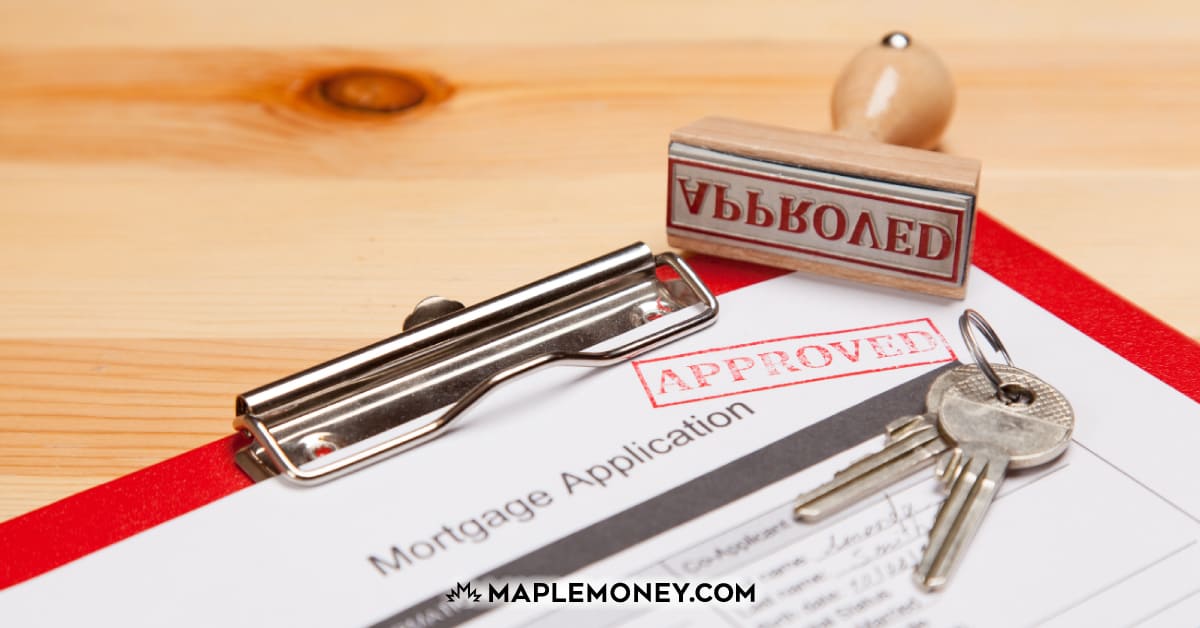How to Get Approved for a Mortgage

Getting approved for a mortgage can be a daunting task. It’s not something the average person has to deal with regularly, so the entire process can seem confusing. Thankfully, there are professionals there to help you along the way – realtors, mortgage brokers, bank advisors, and lawyers – they are the experts when it comes to setting up your mortgage.
But even though help is available, getting approved for a mortgage begins with you, the home buyer, taking the proper steps ahead of time to make sure you’re ready when it’s time to buy a house. Below is a summary of the steps required to get approved for a mortgage. I’ll expand on each section throughout the article. I’ve also included a glossary of essential terms near the end.
Before You Apply for a Mortgage:
- Strong Credit Report.
- Avoid Applying for other Credit
- Stable Employment
- Your Down Payment
Mortgage Approval Process (4 Steps):
- Get Pre-approved Through a Mortgage Broker or Lender
- Hire a Realtor
- Place an Offer
- Obtain Final Mortgage Approval
Before You Apply for a Mortgage
Buying a house is not something that you should do on impulse. So long before you visit your mortgage broker or lender to get pre-approved, you should be getting your finances in place. Here’s a list of things you’ll want to have in place in advance:
A Strong Credit Report
When getting a mortgage, the higher your credit score, the better your chances of being approved and getting the best possible interest rates. Right now, a score of 680 is the minimum required to get the lowest possible rate.
But there’s more to your credit than just the score. If you have any delinquent credit accounts on your bureau or unpaid collection items, you must bring these up to date before applying for a mortgage. If your credit score is too low, you may need to wait before getting a mortgage. In the meantime, focus on paying down other debt, like high-interest credit cards, and be sure to make all payments on time.
Avoid Applying for other Credit
If you’re planning to get a mortgage, I recommend that you avoid taking out any other credit until you are pre-approved. The monthly payment on a new car loan will impact the amount of mortgage you qualify for and leave you unable to purchase the right home in the location you want to live in.
Stable Employment
Mortgage lenders will want to confirm that you are receiving regular employment income, enough to service the mortgage payments. They also want to see that you’ve been working for the same employer for a while. It’s a good risk indicator, and the longer you’ve been at your job, the lower the risk. So, if you’re new to a job, make sure you’re at the very least past your probationary period before you apply for a mortgage.
Your Down Payment
Before you start house shopping, you need to have your down payment ready. In Canada, the minimum down is 5% of the purchase price of a home. With 20% down, you can avoid costly CMHC fees and qualify for what’s called a conventional mortgage.
You cannot borrow money for your down payment. It cannot come from a line of credit or credit card, the one exception being a Home Equity Line of Credit, because in that case, you’re using equity from an asset that you already own.
You can use your accumulated savings, investments including RRSPs, or an employment bonus, provided it’s been in your account for at least 30 days. In addition, parents or another close family member can give you a portion or all of the down payment, as long as they provide a gift letter as proof.
Obtain a Mortgage Pre Approval
These days, real estate agents want you to be pre-qualified for a mortgage from your lender before they begin showing you houses. The housing market is so competitive, and they only want to deal with serious buyers.
There are more benefits to a mortgage pre-approval than simply appeasing your real estate agent. Your lender will be able to let you know how much you can spend on a home, and they can also lock in an interest rate for you for up to 120 days.
You can apply for a pre-approval through any mortgage broker or mortgage lender, like a bank or credit union. You’ll need to provide them with income confirmation, and they’ll check your credit score. You’ll also need to let them know where your down payment will be coming from, although you won’t have to put any money down yet.
Curious as to how the mortgage amount you can afford? This Mortgage Qualifier Tool lets you plug in numbers for different scenarios to give you a good idea.
Hire a Realtor
Once you’ve been pre-approved, it’s time to hire a realtor who will represent you during your home search. But don’t just call the first realtor you hear about online or stop at the first office you drive by. It pays to do a little research and make sure you find a realtor who will be the right fit. Here are some ways to narrow the search:
- Ask for recommendations from friends and family
- Check online reviews
- Create a shortlist of active agents in the area where you’ll be looking
- Conduct an interview (in-person if possible, or via the phone)
- Visit open houses to see realtors in action
Place an Offer
It sounds so simple. Hire a realtor, and place an offer on a home. Unfortunately, finding the right house can take time. You might look at 20 or 30 houses before you’re ready to make an offer, or you might have multiple offers rejected if the housing market is a competitive one where you live. Unfortunately, that’s the reality that many prospective home buyers face in 2021, right across Canada.
When you do place an offer, your realtor will help guide you through the process. However, there are some things you should keep in mind. For example, always insist on making a home inspection a condition of your offer. Most home buyers are not professional contractors, electricians, or plumbers.
A licensed home inspector will spend a couple of hours looking for problem areas in the home – signs of water damage or outdated electrical wiring. They’ll check the roof’s condition and windows and look for cracks in the foundation – trust me; it’s worth spending a few hundred dollars to make sure the house you’re buying isn’t a ticking time bomb.
Obtain Final Approval for Your Mortgage
Once the seller has accepted your offer, it’s time to get the final mortgage approval from your broker or bank. After that, the application moves from the preapproval stage to being a “live deal.” You may need to provide your lender with updated income, depending upon how much time has passed.
They will also need proof of down payment, a copy of the offer to purchase, and an MLS listing unless it’s a private sale.
Usually, your realtor will email these documents to your lender as soon as they’re available. When the lender is approving your mortgage, they’re not just looking at your credibility as a borrower; they’re also assessing the value and marketability of the home you’re purchasing. The lender will be using the house as security for your mortgage, so they want to know that it’s worth the price that you’re paying for it.
Often, they will require an appraisal on the house before issuing final approval. The appraisal is usually done at the home buyer’s expense and costs approximately $300.
Mortgage Approval – Glossary of Terms
Here is a list of terms you will become familiar with as you go through getting approved for a mortgage and purchasing a home. But, of course, it never hurts to have a head start.
Down Payment
As the borrower, the down payment is the amount of money that you will contribute from your own resources towards purchasing a home. The minimum down payment percentage in Canada is 5% of the purchase price for a CMHC-insured mortgage. Conventional mortgages can be had with 20% down, with the benefit being lower fees.
Mortgage Stress Test
To ensure housing remains affordable for Canadians, not only in the short term but also down the road, the federal government has imposed a mortgage stress test that Canada’s primary mortgage lenders must comply with. The stress test sets a minimum interest rate that your lender will use to establish a qualifying payment for a home borrower. By qualifying at a higher rate than is available in the current market, the government is building a buffer for homeowners should mortgage rates rise in the future.
Offer to Purchase
When you find the house you want to buy, you’ll submit an offer to purchase to the seller through your realtor. An offer is a contract that lays out all of the pertinent details of the sale, including the purchase amount, closing date, any conditions benefitting the buyer, any conditions benefitting the seller, special requests, etc. Before an offer to purchase is finalized, both parties must sign and witness. In addition, the buyer and seller must acknowledge any conditions agreed upon in the offer.
MLS Listing
MLS stands for Multiple Listing Service, which is an industry database used by realtors across Canada. Realtors enter all listed properties into the database, along with their pertinent details. This listing makes it easy for realtors to connect buyers with sellers and lets them share information with interested parties with ease.
Insured Mortgage
Anytime you’re putting less than a 20% down payment on a home, your mortgage will need to be insured. The insurance is mortgage default insurance, and it’s in place to protect the lender, not the buyer.
Three companies in Canada provide mortgage default insurance to lenders: CMHC, Genworth Financial, and Canada Guaranty. They insure the bank against loss if the mortgagor defaults on the mortgage. By removing the risk from lenders, it’s made it far easier for homebuyers to qualify for a mortgage without requiring a more significant down payment.
Conventional Mortgage
A conventional mortgage refers to any mortgage with a down payment of 20% or more. A conventional mortgage does not require mortgage default insurance (CMHC). While the home buyer must come up with a larger down payment, they can avoid the costly fees of paying the CMHC Premium.
Condition of Financing
One of the most common conditions found on an offer to purchase is a condition of financing. It gives the buyer a predetermined time frame (usually around one week) to obtain final mortgage approval. Unless you’re purchasing your house with 100% cash, you need to make sure this condition is included in the offer. If not, and your mortgage financing falls through, you may lose 100% of your deposit to the vendor.
Closing Costs
Closing costs refer to the expenses incurred to buy or sell a home beyond the purchase price. Examples of closing costs include lawyer fees, title search, property taxes, survey fees, appraisal fees, land transfer tax, realtor fees (selling), homeowner’s insurance, etc. Homebuyers should budget anywhere between 1.5% and 3% of the home’s purchase price for closing costs.
Final Thoughts on Mortgage Approval
Getting a mortgage can be complicated – there are so many rules to follow, and the terminology can be confusing. The best advice I can give is to plan early and plan well. There is no such thing as being too prepared for the mortgage approval process. Make sure your credit is strong, your down payment is secure, and your employment is solid. And surround yourself with professionals you can trust. If you do all of these things, it’s a recipe for success.


